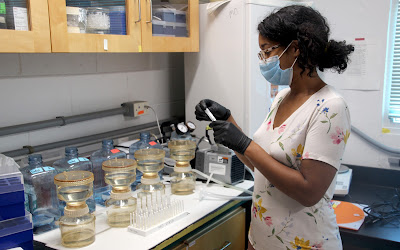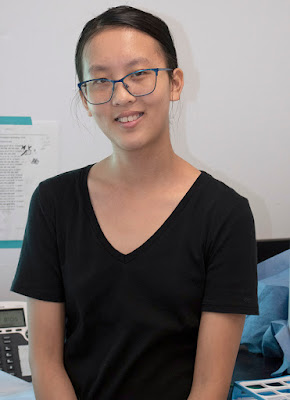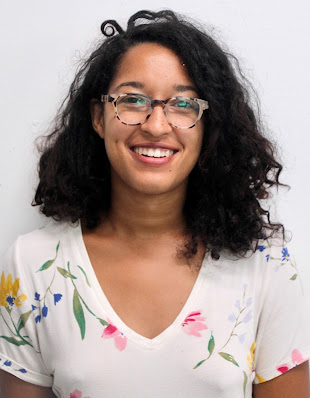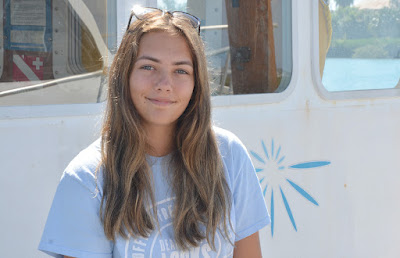Internships for college-aged students were among the educational experiences that were hardest hit by the COVID-19 pandemic. When the BIOS facility was able to safely re-open in accordance with Bermuda government guidelines, the BIOS Education Department made the decision to increase the number of summer internship placements. By combining the popular Bermuda Program and Marine Science Internship, we allowed 21 Ocean Academy interns to participate in lab and field-based experiences at BIOS for 2-8 week placements.
Photo credit: Imogen Peckett.
We would like
to use the this blog post to introduce you to the first half of the 2020 BIOS Ocean Academy interns,
their mentors, and research projects.
Jessica Godfrey
Photo credit: Imogen Peckett.
20, recent
graduate with a bachelor's degree in marine biology from Newcastle University (England)
2018 Bermuda Program Intern
Mentors: Amy Maas, a
comparative physiologist and biological oceanographer who focuses on how the
environment influences marine invertebrates and Hannah Gossner,
a research technician in Maas’ lab who investigates questions relating to zooplankton
ecology, physiology, and transcriptonomics.
Project: Processing
zooplankton samples from the Bermuda Atlantic Time-series Study (BATS) project archives and using the zooSCAN
device to acquire information about species composition and size. This will
clarify any changes in composition or size with seasonality.
“I have
participated in the Bermuda Program before and have always loved the sense of
community at BIOS. The mentors are always so helpful and offer great career
advice. I hope to pursue a career in research and this internship is the
perfect way for me to learn transferable laboratory skills and gain experience
in an area I am passionate about.”
Megan Zimmerer
Photo credit: BIOS.
20, master’s student
in neuroscience at the University of Manchester (England).
2018 and 2019
Bermuda Program Intern
Mentor: Tim Noyes, a research
specialist focusing on coral reef fisheries and fish populations.
Project: Collecting
environmental DNA (eDNA) and using it to derive data on fish biodiversity.
“I am eager
to get back into the labs and continue to develop my scientific research
skills."
K'ari Bean
Photo credit: BIOS.
19, current associate of science student at Bermuda College
First Year Ocean Academy Intern
Mentor: Samia Sarkis, director of research and development for the Living Reefs Foundation and a BIOS adjunct faculty member.
Project: Assessing the best environmental conditions for coral larvae to grow.
"I am doing this internship so that I can see what the life of someone in the field of marine biology is like."
Brianna Simmons
Photo credit: Imogen Peckett.
19, rising sophomore in marine biology at Roger Williams University (U.S.A.)
2019 Bermuda Program Intern
Mentor: Yvonne Sawall, a marine benthic ecologist whose research focuses on coral reefs and seagrass meadows.
Project: Manipulating levels of light, oxygen, photosynthesis, and respiration to determine the resilience of mustard hill coral (Porites astreoides) and great star coral (Montastrea cavernosa). This will help determine which coral is more successful at adapting to changing environmental conditions.
“I'm doing the internship to help me develop my skills as a marine biology major in college. I did the internship last year and had an amazing time so I decided to do it again this year.”Saxon Davis
Photo credit: Imogen Peckett.
18, recent graduate of Warwick Academy (Bermuda)
First Year Ocean Academy Intern
Mentor: Yvonne Sawall, a marine benthic ecologist whose
research focuses on coral reefs and seagrass meadows.
Project: Manipulating levels of light, oxygen, photosynthesis, and respiration to determine the resilience of the mustard hill coral (Porites astreoides) and great star coral (Montastrea cavernosa). This will help determine which coral is more successful at adapting to changing environmental conditions.
“I wanted to do this internship because I thought it would be a great way to combine my love for the ocean and biology, while giving me a chance to put the material I learned in biology and chemistry classes to a practical use.”
Nasir Rudolph
Photo credit: Imogen Peckett.
18, rising freshman in marine science at the University of Miami (U.S.A.)
First Year Ocean Academy Intern
Mentor: Matt Enright, a research specialist who works with BIOS chemical oceanographer Nicholas Bates on multidisciplinary research investigating various aspects of marine biogeochemistry.
Project: To troubleshoot the automated infared inorganic carbon analyzer (AIRICA) to measure levels of dissolved inorganic carbon (DIC) in seawater samples.
“I am participating in this BIOS internship to gain valuable first-hand experiences, which will give me insight into what field of marine science I want to specialize in after college.”
Treiana Zuill
Photo credit: Imogen Peckett.
17, rising
junior in coastal environmental science at Flagler College (U.S.A.)
2019 Bermuda Program Intern
Mentor: Robbie Smith,
curator of the Natural History Museum at the Bermuda Aquarium Museum and Zoo
and BIOS adjunct faculty, with research focusing on lionfish and mesophotic
reefs.
Project: Conducting surveys to monitor Bermuda’s
inshore fish populations along several patch reefs around the island. Thesedata will then be compared to other studies
carried out over the past few years to determine which areas require additional
conservation measures.
“I'm
participating in the Bermuda Program again this year because I genuinely feel it
is an amazing and opportunity to gain field experience in the environmental
sciences.”
Amber
Wolffe
Photo credit: BIOS.
27, rising
senior in meteorology and mathematics at Metropolitan State University in
Denver (U.S.A.)
2015 Bermuda Program Intern
Mentor: Mark Guishard,
director of the Bermuda Weather Service and BIOS adjunct faculty whose research
focuses on the variability of Atlantic hurricane risk, Bermuda’s weather and
climate, and local disaster risk reduction.
Project: Focusing
on the effect of wind shear—changes in wind speed or direction over short
distances—on aircraft approach at the L.F. Wade International Airport in
Bermuda.
“I decided to
return for another internship because I wanted to improve my research skills.
Though I had written many research papers over the last 5 years, I still felt
that I was lacking in key aspects such as precision and approach. I wanted to
enhance the skills I learned and use them throughout this experience to mold
myself while gaining the fundamental skills needed for professional
development.”
Zoe
Skinner
Photo credit: Imogen Peckett.
18, rising
second year student in biochemistry at the University of Surrey (England)
2019 Bermuda Program Intern
Mentor: Rachel
Parsons,
a microbial oceanographer who investigates how microbial communities adapt to
changing oxygen levels.
Project: Examining how surface ocean bacteria respond to dissolved organic carbon (DOC) from Sargassum with and without nutrients.
“Last year, I
had my first in-depth introduction to scientific research while at BIOS. It was
due to this experience that I began to pursue a science degree in university.
This summer I hope to continue to learn about the ocean and begin to better understand
its complexities.”
Jasper Hunt Thomas
Photo credit: Imogen Peckett.
17, rising
senior at Collegiate School (U.S.A.)
First year
Ocean Academy Intern
Mentor: Robbie Smith, curator of the Natural History Museum at the Bermuda Aquarium Museum and Zoo and BIOS adjunct faculty, with research focusing on lionfish and mesophotic reefs.
Project:
Using transects to examine resident fish species on Bermuda’s shores. This
will provide knowledge of the number of fish, species, and size of fish at a
variety of coastal areas around Bermuda.
“I am doing
the Ocean Academy internship to get a feel for marine biology research, and
as a way to see if I want to pursue marine fish science as a profession.”
Gloria Simmons
Photo credit: Imogen Peckett.
18, rising third year student at Mount Allison University (Canada)
First Year Ocean Academy Intern via the Chubb Community Service Values Summer Program
Mentors: Amy Maas, a comparative physiologist and biological oceanographer who focuses on how the environment influences marine invertebrates and Hannah Gossner, a research technician in Maas’ lab who investigates questions relating to zooplankton ecology, physiology, and transcriptonomics.
Project: Imaging zooplankton to determine species, size, and quantity of these species.
“I was placed in this internship through the Chubb community service program. I chose to work at BIOS because I am studying science and wanted to work in a science related charity.”
We hope to
see you in part two of our blog, which will introduce you to the second half of
the 2020 Ocean Academy summer interns.



























